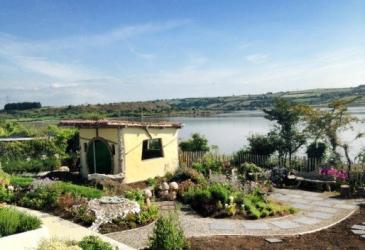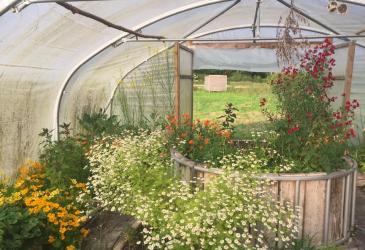Stormont Workplace Allotments
Region: Belfast
Established: 2012
When did the project start and why?
The Stormont Workplace Allotments were launched in May 2012 by Sammy Wilson MP MLA for Northern Ireland Civil Service (NICS) staff based within the Stormont Estate.
The Stormont Estate Workplace Allotment project was developed as a pilot project. It is the first of its kind in Northern Ireland The objectives of the Stormont Estate Workplace Allotments project are as follows:
- To provide a facility for the participation in a healthy recreational activity which is easily accessible from the workplace and which contributes to the overall health and wellbeing of staff;
- To provide staff working on the Stormont Estate with a facility to produce their own local, low cost, fresh food;
- To provide opportunities for members of the Stormont Workplace Allotment scheme to learn new skills, develop existing skills and to share learning with others;
- To provide a shared space where people can mix, socialise
Who has been involved (partnerships and collaborations)?
This is a partnership between Civil Servants working on the estate, DFP Estates Management Unit and the Federation of City Farms and Community Gardens. There was also an advisory board comprising the Northern Ireland Public Service Alliance, the Occupational Health Service and Corporate HR.
What kind of community consultation and engagement has taken place?
The community in this case are the civil servants who work on Stormont Estate, an expression of interest email went out to all staff and over 100 applications were received for 25plots.
Successful applicants were drawn from a hat.
Approximately how much funding have you got and where does it come from?
The area in question was a nursery area for whips etc to be used in the Estate so all the infrastructure was in place. A small amount of work was required to divide the plots with money diverted from the estate maintenance budget to cover.
The project is currently managed by DFP Estate Management Unit as the Landlords of the ground. Whilst DFP will always have a role it is hoped that the Allotmenteers will take more control of day to day issues by means of an elected committee.
The project is currently overseen by the Stormont Estates team, who manage maintenance and plotholder lists. Social Farms & Gardens contribute the facilitation of regular meetings and trainings, with an aim to having some level of self-management in the future.
What happens at the project - activities etc?
Employees on the estate tend their plots on their lunch breaks, after work and at weekends. They have a container for tools etc, but hope to get a shed at some stage in the future. To date there have been a number of community work days to build compost bins, improve fencing etc, and a communal seed order was organised this spring.
What's been the best thing about setting up and running the project?
The group of allotmenteers have begun to form as a group, and seem to be getting on with each other and developing relationships. It is great to see people beginning to organise themselves, to improve the site and cooperating on administration like seed orders.
Have you encountered any difficulties or problems?
Biggest problem has been the lack of use of plots by a small number of staff. The plots are free and it is therefore particularly disappointing when they are being used to their full potential
From the lessons you have learned, what advice you would most like to give to someone else thinking of setting up a food growing project?
This project would differ from most others but the one thing it would have in common is people coming to Allotments for the first time. Raising the awareness of the time and ‘hard work’ it takes to get an Allotment into shape would be the best advice. Then people cannot say they didn’t realise.
Who benefits from the project?
The allotmenteers benefit from having access to green space and an alternative activity close to the workplace. There is evidence that contact with green spaces and allotments improve people’s experience in their working lives. Evidence links green spaces increased workplace productivity. They also gain the experience of learning to grow vegetables, and of course will hopefully get fresh veg to take home.
Apart from being able to grow your own food what have been the other benefits of the project?
The Civil Service Occupational Health Service are carrying out 6 monthly health and wellbeing surveys to monitor the perceived effect of the allotments on users, and these results will hopefully be available soon. We will also carry out our own survey of Allotmenteers regarding the social side of the allotments.
Long-term sustainability of the project - what will happen in the future?
There is a waiting list for plots, and there may be scope for expanding the project, and providing larger plots. At the minute interest and involvement seems healthy, and as running costs are relatively low, it seems that the project will continue. Some facilitative input from Social Farms & Gardens, as well as the continued support of the estates team will be vital on an ongoing basis.
In its capacity as a pilot project the Stormont Allotments have certainly sparked interest from other employers and groups who would now like to explore the idea for their own allotments, but as yet no study visits have taken place.
Related Case Studies
Blossoms at Larne Lough specialises in using Nature-based Therapy to increase health & wellbeing and decrease stress. It is run from a purpose-built therapy garden on the shore of Larne Lough.
Common Ground N.I. has the mission of connecting individuals, groups and communities with nature for the benefit of humanity and for reciprocal benefits to nature.









